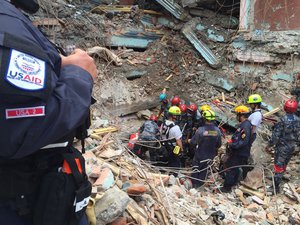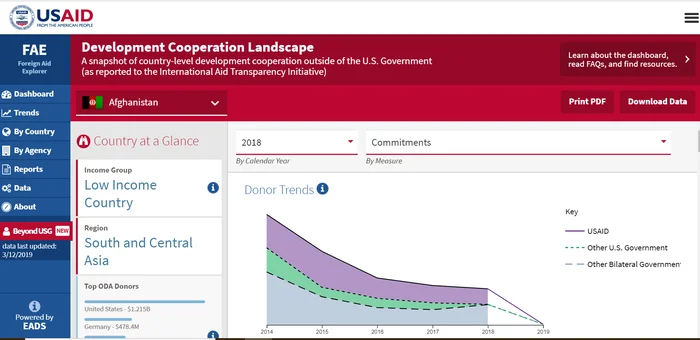USAID: The value of transparent data in humanitarian crises

USAID’s Andie Vaughn, Senior Policy Advisor in the Bureau for Policy, Planning and Learning and Chair of IATI’s Data Use Task Force, and Elizabeth Bellardo, Acting Division Chief for the Humanitarian Multilateral Division in the USAID Bureau for Humanitarian Assistance, discuss the importance of IATI data in humanitarian financing, especially during crises.
As part of the Grand Bargain agreement, the U.S. Government continues to work with more than 60 donors and aid organizations to ensure humanitarian financing is as efficient and effective as possible. Among the agreement's important aims is a commitment to increase transparency of humanitarian financing, from donor to beneficiary, in order to improve response planning.
Together with the other signatories, the U.S. Government committed to publishing open data on its humanitarian aid using the IATI Standard
Together with the other signatories, the U.S. Government committed to publishing open data on its humanitarian aid using the International Aid Transparency Initiative (IATI) Standard, which is a set of rules that guide what data organizations should publish and a standardized format for how the data should be presented.
Using the IATI Standard enables civil society, partner governments, and donors to access data on development to improve decision-making. The U.S. Government became a member of the Initiative in 2011, first published activities to the IATI Registry in 2013, and continues to regularly publish billions of dollars of U.S. Government humanitarian assistance and development cooperation to IATI.
As part of its commitment to the Grand Bargain transparency workstream, USAID has improved both the timeliness and comprehensiveness of the data it reports to IATI. For example, USAID now publishes humanitarian data on a monthly basis —versus quarterly—and has added the humanitarian flag element and cluster codes in the IATI Standard to allow data users to easily distinguish between humanitarian and development activities.
Transparent, easily accessible, comparable data is crucial, particularly for complex, fast-moving crises, such as the current COVID-19 pandemic
By sharing IATI data on humanitarian assistance and activities, USAID is providing humanitarian partners across the globe with up-to-date information to help illustrate the funding landscape of responses. As part of its commitment to the Grand Bargain, USAID has improved both the timeliness and comprehensiveness of the data it reports to IATI.
Transparent, easily accessible, comparable data is crucial, particularly for complex, fast-moving crises, such as the current COVID-19 pandemic. USAID welcomed, and is committed to using IATI's guidance on publishing data to IATI on COVID-19 responses - and hopes other partners will follow suit.
Value of IATI humanitarian data
As more stakeholders report to IATI, the potential value of the data increases as a source of macro donor data on humanitarian efforts. With IATI data, USAID developed the Development Cooperation Landscape tool, which makes funding and activity-level information across responses and donors easily accessible.

USAID uses IATI data in their Development Cooperation Landscape tool
IATI is also adding value to existing data sources, such as the United Nations Office for the Coordination of Humanitarian Affairs’ (OCHA) Financial Tracking Service (FTS). OCHA is expanding the capabilities of FTS to import IATI humanitarian data, which will strengthen the FTS platform to serve as a more accurate and timely resource for the humanitarian community as a whole. USAID’s humanitarian teams ensure the data it provides to IATI helps to streamline the reporting processes for humanitarian financing.
Increased commitment by humanitarian community
USAID recognizes that the potential for IATI data to improve transparency and better inform humanitarian responses depends on donors and implementing organizations committing to regular and detailed reporting of funding and activities. USAID encourages organizations to publish high quality data to the IATI Registry, and subsequently FTS, as well as expanding the details populated in humanitarian fields.
Consistent, committed efforts on behalf of the entire humanitarian community, including USAID, to improve reporting remains a clear path to understanding the humanitarian funding environment and ensuring transparency around funding intended to reach those most in need.